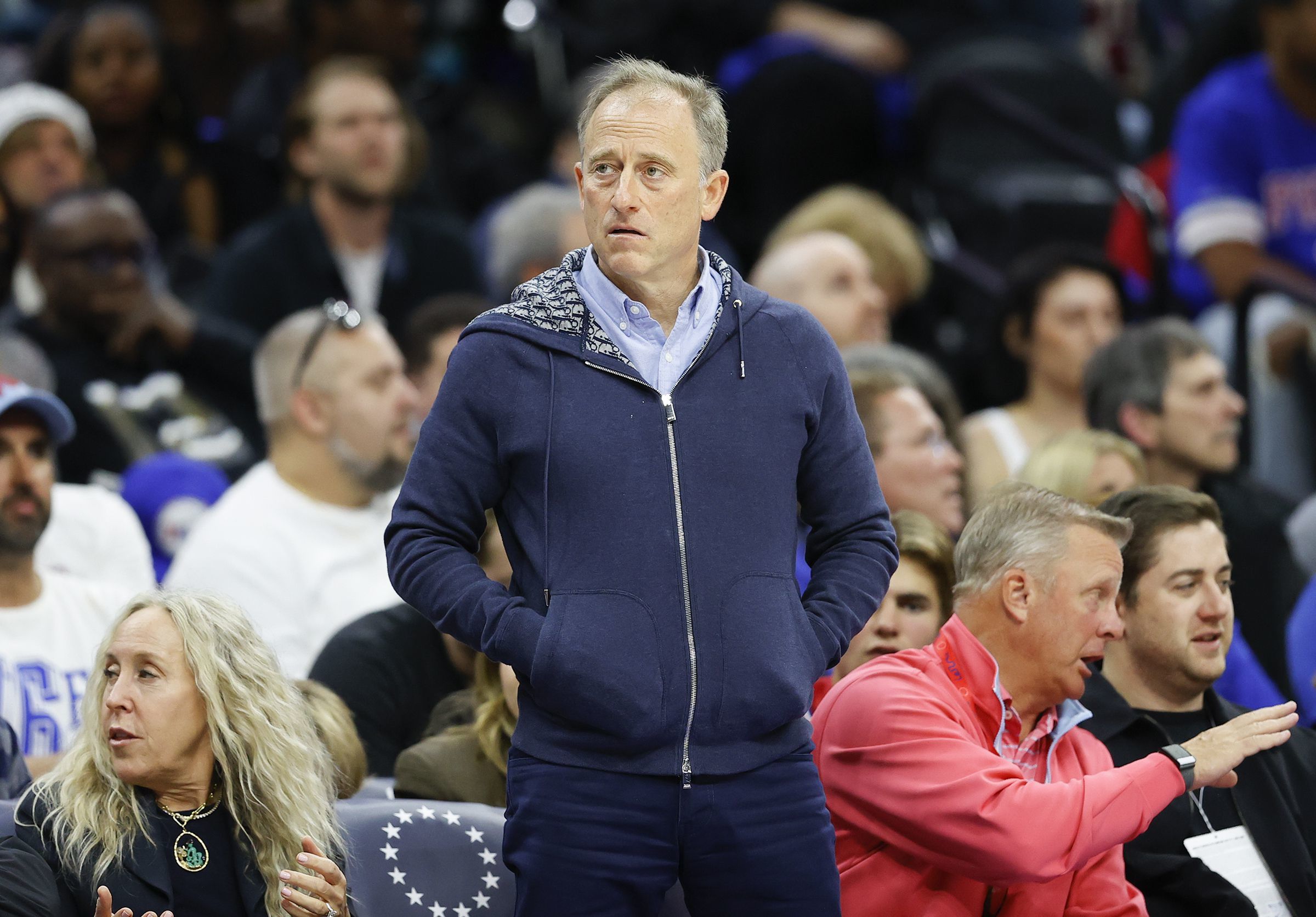Three billionaires — private-equity investors Josh Harris and David Blitzer, who are co-managing partners of the NBA’s Philadelphia 76ers, and apartment developer David Adelman — want to finance and build a new Sixers arena at 10th and Market Streets in Center City
A fourth billionaire — Comcast chief executive Brian L. Roberts — could lose if they do. The Sixers currently pay to use Comcast Spectacor’s Wells Fargo Center in South Philadelphia, and company officials say they expect that it will remain “a premier venue” even after the Sixers’ current lease runs out in 2031, when the partners hope their new 18,500-seat house will be ready.
While labor leaders and some elected officials have lined up behind the Sixers’ idea, neighbors in Chinatown are pushing back. So both sides have powerful friends if it comes to a fight — and plenty of resources, including their own personal funds.
Here’s how the four got where they are today.
The deal maker: Josh Harris
Harris, 57, is a founder and past chief executive at Apollo Global Management, a Wall Street firm that invests half a trillion dollars for clients.
Like other private-equity firms, Apollo concentrates on making money for its partners and their investor clients, including with its special focus on corporate buyouts, carve-outs and distressed-company reorganizations. Past deals have involved chemical giant LyondellBasell, whose U.S. research center was in Newtown Square and whose highly profitable sale in 2013 cemented Apollo’s reputation. Others include publisher McGraw Hill; snack giant Hostess; natural gas developer El Paso Corp.; Hollywood producer Legendary, and a range of insurance businesses.
Harris grew up in Maryland and graduated from Penn’s Wharton business school in 1986. He went straight to work researching mergers for the junk-bond financing shop headed by another Wharton graduate, Michael Milken. Harris left two years later to get his Harvard MBA in 1988, a year before Milken’s arrest on charges of racketeering and insider trading. (Milken was convicted and jailed, but later pardoned by President Donald Trump.)
Harris then joined a group of Milken ex-lieutenants, led by his former mergers supervisor, Leon Black, in founding Apollo, which brought the innovative financing part of Milken’s legacy to Wall Street’s mainstream and made it attractive to state pension funds, such as Pennsylvania’s PSERS teacher retirement system.
“It is not unusual for Apollo to attract negative media coverage,” PSERS staff warned in a 2017 memo to board members, adding that expected profits made the risk worth taking. That year, Harris joined a group of investors who met with Trump to talk about the president’s infrastructure spending plans.
Like other private equity funds, Apollo charged investors such as PSERS 1% to 3% of assets per year, plus 20% of profits above target levels — many times more than stock-and-bond fund investors such as Vanguard Group charge. The arrangement, and Apollo’s big stakes in industries from oil to insurance, led clients to big profits in some years and losses in others.
The company earned $1.8 billion after taxes last year, on sales of $6 billion.
By mid-2021, Harris owned 20% of Apollo, worth more than $2 billion. He also owned extensive private investments, such as the Hill, the newspaper that covers Congress, which he and a group of smaller investors sold last year.
Harris is best known as an acquirer of sports teams — heading the group that bought the Sixers in 2011 from ComcastSpectacor for $280 million.
Harris and Blitzer bought the New Jersey Devils hockey team for a reported $300 million-plus the next year. The pair in 2015 became part of the majority ownership group in the U.K. Premier League’s Crystal Palace soccer club. Their company, Harris Blitzer Sports Entertainment, also owns farm teams, sport tech investments, and other ventures.
Forbes this year estimated Harris’ net worth at more than $5 billion.
Last year Harris pushed his longtime boss, Leon Black, to leave the company after revelations that Black had paid convicted sex offender Jeffrey Epstein more than $150 million for what Black characterized as financial advice, according to news reports.
When Black left, Harris briefly took over as Apollo’s CEO but stepped down two months later, under pressure from Black’s remaining allies at the firm, according to financial media reports.
He began selling his Apollo stock and owned less than 5% when the company reported its major owners to investors this past spring. Last year Harris bought a Miami estate for a reported $32 million. He has shown a continuing interest in acquiring more pro sports teams, though he was outbid for the Denver Broncos in June by a $4.5 billion deal by an heir to the Walmart fortune.
The tactician: David Blitzer
Blitzer, 52, heads Blackstone’s Tactical Opportunities group, which invests about $35 billion at Blackstone, another Wall Street private-investments firm. It manages about $900 billion.
Blitzer, who grew up in New York’s Jersey suburbs, entered Wharton the year after Harris left, graduated in 1991, and went straight to work for Blackstone, cofounded by Abington native Stephen Schwarzman. (BlackRock, a much larger investment firm, separated from Blackstone in 1994.)
A partner with Harris in purchasing the Sixers, Devils and Crystal Palace, Blitzer has a lower-profile job at a larger Wall Street firm. Like Apollo, Blackstone has grown rich investing pension funds for Pennsylvania and other states.
Investments targeted by Blitzer’s Tactical Opportunities group include data center operator VNET, military contractor Arka, cell and gene therapy materials provider Cryoport, and other software-based companies.
Blackstone is well-known for its real estate funds, which have absorbed casinos (Crown Resorts), offices (Sam Zell’s Equity Office Properties), and apartments (Preferred Apartment Communities), among many others.
Blackstone’s recent focus on buying and leasing single-family houses has some investors questioning its impact on rents and home prices. The firm has said its investments are helping, not hurting, U.S. housing markets.
Business news accounts have estimated Blitzer’s personal fortune at $1.3 billion.
The developer: David J. Adelman
Adelman, 50, a native of Penn Valley, apprenticed with West Philadelphia-based Campus Apartments as a teenager, tending rentals for Penn and Drexel students. He left home to attend Ohio State University but came back to Campus and became CEO.
Adelman helped rally the universities and other West Philly players to form the University City District, which added patrols that helped make the neighborhood cleaner and safer, according to John Fry, then a top Penn official and currently Drexel’s president.
Adelman expanded Campus Apartments, building housing at Shippensburg, St. Joseph’s, Franklin and Marshall, Emory and other universities, and branched into renter telecom services and real estate financing.
In 2007, he joined Philadelphia lawyer Michael Forman to found FS (Franklin Square) Investments, which now manages more than $20 billion from offices at the Navy Yard. He is a close friend of Fanatics owner Michael Rubin, a minority Sixers owner who recently announced plans to sell his shares. Other Adelman investments include “on demand” private-jet provider Wheels Up, fin-tech lender Cred.AI, and vodka-soda maker Vide Beverages.
In his role as chairman of the Sixers arena development company, 76 Devcorp, Adelman has said the group will reach for aggressive diversity hiring targets and pointed to his record beating such targets, for example at a St. Joe’s housing project and a Homewood Suites hotel, both in West Philadelphia.
The landlord: Brian L. Roberts
Roberts, 63, grew up at Comcast, helping his father, Ralph, the company’s founder and CEO. Cable TV may have lagged as more Americans have “cut the cord,” but Comcast’s early and ongoing investment in internet delivery has paid off, as Comcast is now the nation’s largest broadband internet provider.
Comcast’s president since 1990 and chief executive since 2002, Roberts has been willing to risk the wrath of deal-averse investors by pushing a series of bold acquisitions, including the successful takeovers of AT&T Broadband (2002), NBCUniversal (2009-13) and UK-based Sky (2018), as well as failed attempts on Disney (2004) and TimeWarner (2015).
While his father invested in a wide range of businesses, Roberts has not shown a high profile as an individual investor. Forbes estimates his net worth at around $1.5 billion, mostly from Comcast stock.
Roberts’ influence goes beyond the company’s financial value. Comcast has maintained a long relationship with government in Philadelphia and many other communities where it does business, gaining market dominance with public franchise deals and private acquisitions.
Then-Philadelphia Mayor Ed Rendell explained his 1999 decision to resist a rival’s application for permission to compete with Comcast by calling the company “one of our best corporate citizens.”
In a public statement sent to reporters the day the Sixers managing partners and Adelman announced the new arena plan, Comcast’s Comcast Spectacor division defended the Wells Fargo Center as a “world-class facility” in an “incredible” South Philly stadium neighborhood, the recipient of “hundreds of millions” in Comcast and city funds.
“We want what’s best for Philly sports fans,” said Comcast spokesman John Demming.
©2023 The Philadelphia Inquirer. Visit inquirer.com. Distributed by Tribune Content Agency, LLC.

